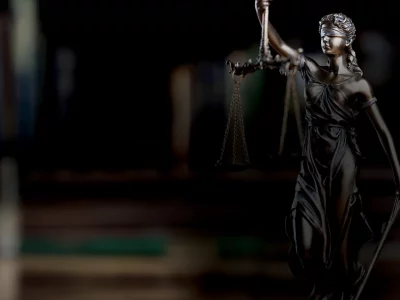

Lawyer or Politician: What is the Attorney General?
From a Reader’s Lecture held on 13 November 2023.
It is a long time since I last spoke about the role of the Attorney General, for which it was my privilege to hold the office from 2010 to 2014. The Attorneys are rather silent figures. Indeed, it was always said that if the Attorney got in the news, it was either because the government was in serious trouble or the Attorney was in serious trouble, or possibly both.
The Attorney’s role is very varied, and that’s what I want to talk to you about. I was going to do three things. Firstly, to explain the history of the office and how it has evolved into its current form. Secondly, explain what the role is at present. And then finally, I thought we could have a debate around the role, including looking at calls for change (of which there have been quite a few) and indeed criticisms of the way in which the office exists or the role discharged.
It was always said that if the Attorney got in the news, it was either because the government was in serious trouble or the Attorney was in serious trouble, or possibly both.
Apart from the Lord Chancellor, the office looks to be the oldest in our governmental system, and it comes as no surprise that it first emerges with the development of our court system in the 13th century, in those immediate decades after Magna Carta. English kings could only dispense justice through their judges, and the reason for that was because kings had a partiality and an interest which they also needed to have represented. The role emerged because the king needed his interest to be represented in his courts.
The first person of whom we know anything doing this role was a man called Laurence Del Brok, who appears in a record as receiving payment in 1243. It is unclear whether he was actually the Attorney General or was essentially a sergeant at law who had been retained for that particular purpose. In the 16th century, the role developed into a mixture of prosecuting traitors and asserting monarchical prerogative and property rights, and advising the government (or the council of the monarch) at the same time. While the Solicitor General started frequently to be a member of parliament, the Attorney remained a Crown official because he was holding an office of profit under the Crown. But things started to blur. Francis Bacon, in the early 17th century, was both Attorney General and a member of parliament. The Commons did not like it. They passed a resolution in 1614 that thereafter no Attorney General should at any time be of the House. But that objection frittered away, and by the end of the 17th century, it had become a semi-requirement that the Attorney should also be a member of the House of Commons. He and the Solicitor General were turning from counsel for the king into being the law officers of the government.

Above all, the Attorney turned into an adviser to government, whilst at the same time keeping a practice at the Bar. That continued until the 1890s when the Attorney and the Solicitor General ceased to have private practices, but they could still charge fees for the court work they did for the government, as well as being paid a retainer for being the law officers. This was an arrangement which did not appeal to Clement Attlee after the Second World War. Sir Hartley Shawcross then negotiated a package for the law officers that made them salaried like any other ministers of the Crown.
The big change that has happened in the last 40 years is about the role of the law officers in respect of both the scale of their advisory work and the scale of their litigation work. Up to the 1980s they had an enormous amount of work in court, although it could vary according to the taste of the law officer concerned. The volume of other responsibilities now makes court work in practice quite difficult to juggle with the other duties for the Attorney General. The Attorney is not a member of the cabinet. He may attend it and usually does. He is its legal adviser, and by being present he is able to be aware of what is going on.
But what does the Attorney General really do today? First, some key aspects of the historic role are very much present. Although the Attorney is appointed by the Prime Minister and he can be fired by the Prime Minister, the Attorney is the Sovereign’s Attorney General, not the Prime Minister’s Attorney General. The oath of office remains that set down in the middle of the 16th century and makes that clear.
To do the work, the Attorney and the Solicitor have a small department. When I was there, we were 42, of whom there were 17 lawyers brought in from elsewhere in government. Nowadays, the Solicitor General is the deputy of the Attorney. The work is allocated out between the two of them. They have offices adjacent to each other. They work together and hopefully talk together and cooperate well together in a good relationship. Ultimately, it is the Attorney who handles the most important work and is the senior.
Although the Attorney is appointed by the Prime Minister and he can be fired by the Prime Minister, the Attorney is the Sovereign’s Attorney General, not the Prime Minister’s Attorney General. The oath of office remains that set down in the middle of the 16th century and makes that clear.
The first and most important aspect of the job is advising the government. Now, how is that actually done? Most advice, of course, doesn’t have to come from the Attorney at all, but from those lawyers in government who are embedded in departments. Since leaving office, I’ve heard, rather to my horror, sometimes it being described that the Attorney General is the minister in government who commissions legal advice. Well, if that is how some Attorneys have been viewing it, it is not constitutional, because it is absolutely clear that at the end of the day, the letter that goes out in the name of the Attorney or Solicitor is their advice, not somebody else’s.
By convention, the fact that the Attorney has or has not advised is never disclosed, nor the content, although there have been some exceptions. Lord Goldsmith’s advice on Iraq did eventually see the light of day. And, of course, Geoffrey Cox found himself the subject of a humble address by the House of Commons that forced his advice to Theresa May on how the Northern Ireland protocol would work in practice to be revealed. I spoke and voted against doing that, because if the Attorney’s advice is routinely revealed it is going to cause really serious problems – as it would in any relationship between client and lawyer.
By convention, the fact that the Attorney has or has not advised is never disclosed, nor the content, although there have been some exceptions.
Attorneys are there to apply the test of respectable legal arguments where the law is uncertain, particularly with international law. The reality is that most of the diet of work being done by the law officers concerns foreign affairs and treaties, constitutional and devolution issues, EU law, and important ECHR and Human Rights Act considerations. In addition to that, there’s an absolute central principle that the Attorney has a duty of candour and the duty to advance proper arguments in court in defending the government’s position, which have to take precedence over just wanting to win a case. It is central to the role of the Attorney that the integrity of the government’s legal positions is maintained at all times. This also applies to Treasury counsel who may act for the Attorney in cases.
The Attorney also has a specific role in relation to the introduction of any legislation into parliament. Before legislation comes in, it has to go before a legislative committee. The department that is sponsoring the Bill produces a brief and vouches for the Bill being ready, points out if it has any unusual powers or retrospective effects, and vouches for its certificate of compliance with the European Convention on Human Rights. But the Attorney has to approve that, and if the Attorney is not satisfied, he or the Solicitor General can turn up and say so. In which case – back to the drawing board, and it may delay the introduction of the legislation. The Attorney can also be an adviser to the House of Commons and the Lords, as long as there is no conflict of interest between the interests of the Commons or Lords and the interests of his work for government. Usually that means giving advice to the Standards and Privileges Committee of the Commons, but it can also involve a legal query in the House on a Bill.
The second role is the superintendence as a departmental minister of the Crown Prosecution Service, the SFO and the Service Prosecuting Authority. That means negotiating their budgets with the Treasury, meeting regularly with their heads, discussing the effectiveness of the service and major cases that might cause parliamentary interest. But, although nominally the DPP and the director of the SFO and service prosecutions are the appointments and the agents of the Attorney, the reality is that they are independent players, and the Attorney is there to protect them from political interference. The Attorney General has significant reserve powers of interference in prosecution, including directing a prosecution being brought, or putting in a nolle prosequi to stop one. But, since the reforms of 2007–08, there is a protocol by which the Attorney General will not interfere in prosecutorial decisions, except in cases of national security.
The Attorney has to also, by statute, provide consent to certain prosecutions. He has to act quasi-judicially in doing that to ensure that the public interest is being served, not somebody else’s interest. I never had to exercise any override. But it is there. It is an ability to look at what is going on and to try to make a sensible judgement on it. It is also true that anyone can write to the Attorney about a prosecution. We used to get lots of letters from private individuals whether consent was required or not. The Attorney could look at a case if he thought it right and might query what was happening if he thought that for some reason justice was not being done. The Attorney can also issue guidelines after consultation with the Director of Public Prosecutions and others. These might be disclosure guidelines for prosecutors, for example. The Attorney also meets regularly with the Lord Chief Justice to discuss the functioning of the criminal justice system.
Finally, in this list, the Attorney has a multitude of functions as guardian of the public interest, in support of the rule of law and the operation of the courts. These are supposed to be done entirely independently of political colleagues. For example, he has power to refer certain unduly lenient sentences to the Court of Appeal – an important power, but one which should not be abused. When I was in office, the view was that if we were referring more than 100 cases a year, we should be worried. It was also a concern if we did not have an 80 per cent success rate on the cases referred. The Attorney also acts as guardian of the public interest in bringing contempt of court cases against media who have breached the Contempt of Court Act. Finally, the Attorney is nominally the leader of the Bar.
I now want to turn to the controversy. The Attorney’s role has always attracted controversy, and most centres on the fact that people do not always like the decisions Attorneys make, and then allege that the reason why the Attorney has made that decision is because he is a politician and not a lawyer and has done it for political reasons. So, there have been calls for the role to be changed. The argument is that the political aspect of the work affects the professional judgment. Matters came to a head in the early 2000s following, firstly, Lord Goldsmith’s advice on the Iraq War, secondly, ‘cash for honours’ (in which Lord Goldsmith got enmeshed, in the sense that he pointed out that he could not resile from his duty to consider the issues in cash for honours as he had to consent to any prosecutions, including whether the Prime Minister might be prosecuted) and thirdly, the BAE bribery scandal – where it was alleged that he had intervened and put pressure on the director of the Serious Fraud Office to drop an investigation.
The view was taken that the range of roles was not a weakness but a strength, as the status of the Attorney as a senior practising lawyer in government and parliament, helped both maintain the independence of the prosecution authorities and guide their policies. It also ensured that there was someone in government who provides an understanding of why the government needs to respect and uphold the rule of law.
Some radical ideas were then put forward to change the role and remove the superintendence of prosecutions completely from the Attorney, which was considered by the Constitutional Affairs Committee of the time. In the end, however, the view was taken that the range of roles was not a weakness but a strength, as the status of the Attorney as a senior practising lawyer in government and parliament, helped both maintain the independence of the prosecution authorities and guide their policies. It also ensured that there was someone in government who provides an understanding of why the government needs to respect and uphold the rule of law – particularly following the significant changes that have taken place in the role of the Lord Chancellor.
It has been pointed out in recent times that the talent pool in parliament for the roles of Attorney General and Solicitor General is diminishing. Between 1997 and 2015 barristers made up 5 per cent of the House of Commons, whereas between 1951 and 1974 it was 15 per cent, and the vast majority of those were silks of considerable experience. That means that, whereas most Attorneys used to be silks of at least five or even 10 years’ standing, now – with the recent exception of Geoffrey Cox – they have taken silk on appointment, or on appointment as Solicitor General. So, we should not be surprised that the issue has now come back again.
I can only give you my personal view. If we were to move to a system where the Attorney is a civil servant, I think that civil servant would be at a considerable disadvantage. Provided you have an Attorney General who understands what the rule of law is and the duties of the law officers, then, in practice, he or she is likely to have far more capacity to influence colleagues, understand their concerns and stand up to them, than somebody who has been brought in from outside. So, I think the politician has more clout than the civil servant, but the politician has to be able to understand what the duties of the Attorney are all about. I am confident my pupil, the current Attorney General, knows that very well indeed, whatever problems there may have been with her predecessor.
For the full video recording:
innertemple.org.uk/attorneygeneral
The Rt Hon Dominic Grieve KC
Former Attorney General for England and Wales
